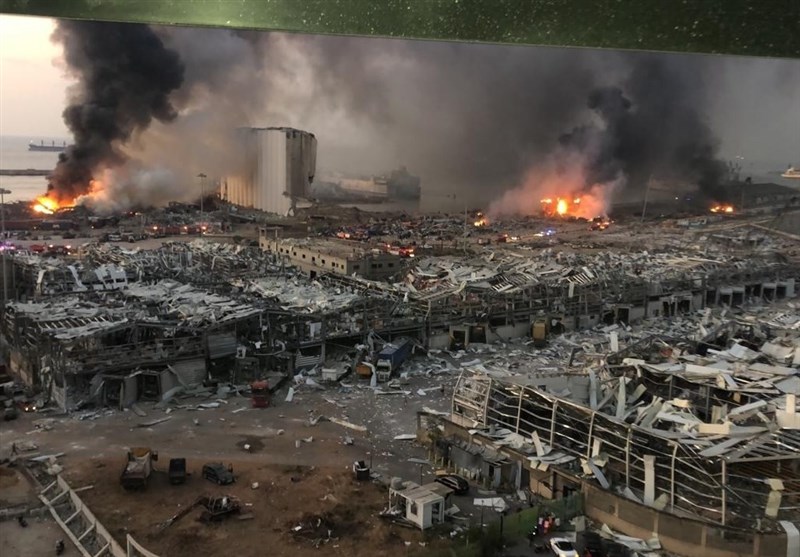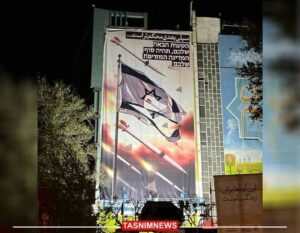Hezbollah has much to conceal concerning the events in Hangar 12 in the port of Beirut, and therefore will not allow a proper investigation to generate genuine results. On the other hand, the reconstruction of the port will yield great economic profits, therefore, the economic interests of the influential parties in Lebanon will cause the reconstruction to occur (needless to say, due to their gains deriving from the corruption…)
On August 4, 2020, exactly one year ago, 2,750 tons of ammonium nitrate destroyed the port of Beirut, which is the main gateway to Lebanon, claiming the lives of more than 200 people and causing enormous damage to properties in large parts of the capital Beirut. The expectation was, that in light of the magnitude of the disaster, the Lebanese authorities would file consolidated indictments against those responsible for the blast, decide on reforms and initiate vigorous rehabilitation work. However, Lebanon’s economic, social, and political situation, together with Hezbollah’s clear interest to incapacitate the investigation of the disaster, neutralizes and blocks any decisions regarding the matter.

As of today, a year after the blast, Lebanon’s government is still considered a transitional government, as a new government is yet to be appointed since the last government resigned following the blast. Saad al-Hariri, who was appointed the new prime minister, has failed over the past eight months to form a new government. On July 26, the mandate to form the new government was handed over to Najib Mikati. Fadi Sawan, the first Juge d’instruction appointed to investigate the explosion at the port, filed charges against Prime Minister Hassan Diab and three former ministers charged with negligence that led to the explosion: Ali Hassan Khalil (former Finance Minister, an Amal movement delegate, an ally of Hezbollah and the subject of U.S. sanctions on charges of corruption and affiliating with Hezbollah), Ghazi Zeiter (former Minister of Agriculture and Minister of Labor and Public Transportation, a member of Hezbollah’s tight circle, accused of favoring deals for Iranian-backed Shi’ite groups) and Youssef Fenianos (former Minister of Labor and Public Transportation, close to Hezbollah and subject to U.S. sanctions for his ties with Hezbollah and involvement in corruption scandals.
In February 2021, Sawan was removed from office for the “obstruction of justice”. Sawan’s dismissal caused a stir on social media in Lebanon, and many accused the Lebanese authorities of disrupting justice and the law. Sawan was replaced by Juge d’instruction Tarek Bitar. Despite fears that Bitar would experience a similar fate to his predecessor and be removed from the investigation, he continued in Sawan’s footsteps. Bitar filed charges, requesting parliament to lift parliamentary immunity from Diab, Khalil, Zeiter, and Fenianos. In addition, Bitar added two other senior officials to the list of accused: Abbas Ibrahim, General Director of the General Directorate of General Security, considered one of Lebanon’s most powerful men, and Nohad El Machnouk (former Interior Minister).
Despite Judge Bitar’s efforts to reach the truth, the Lebanese parliament is delaying the investigation. Representatives of the parliament told Lebanon’s public prosecutor, Ghassan al-Thuri, that parliament was refusing to remove the ministers’ parliamentary immunity. This follows the Lebanese Interior Minister’s statement that he refused to allow Abbas Ibrahim to be investigated. This decision of Parliament came as a serious blow to the investigation process, amid concerns among the victims’ families that the current judge will also find himself removed from the case.
It is our understanding that Parliament’s refusal and the Interior Minister’s refusal to carry out the investigation is a direct result of Nasrallah’s media campaign against Judge Bitar, and therefore comes as no surprise. In his speech on July 5, Nasrallah claimed that there were political goals behind the decisions to strip the accused of their immunity and that these were manipulations stemming from political interests, which he repeatedly rejected.
Simultaneously to the attempts to carry out the investigation, several local and international initiatives intending to rehabilitate Beirut’s port have emerged, but they too have not yet matured into action.
In April 2021, representatives of German companies presented a multibillion-dollar plan to rebuild the port and its surroundings. However, the German plans did not go beyond the proposal stage. France, too, wants to be involved in the reconstruction of the port, tying these efforts to the French initiative to solve the political and economic crisis in Lebanon (France insists on reforms and threatens to impose sanctions on those obstructing efforts to form a government). At the end of June 2021, it becomes known that Russian companies were in the final stages of advancing proposals for the restoration of the destroyed port, in addition to the restoration of other infrastructure throughout Lebanon, such as power plants, silos, and refineries.
In our assessment, in light of the current situation in Lebanon and because Hezbollah has a vested interest in disrupting the investigation of the explosion at the port, it will be very difficult to conduct an orderly investigation that will lead to actual results. As with another defining event in Lebanon, the assassination of former Prime Minister Rafik al-Hariri in 2005, Hezbollah has much to hide regarding the port explosion. Many indications imply that Hezbollah operatives were involved in bringing the nitrate ammonium to Lebanon and storing it at the port and that it was intended for military use by Hezbollah and the Syrian regime. Other indications reveal that the compound at the port where the nitrate ammonium was stored (hangar 12) was a closed compound under the supervision of Hezbollah’s unit 112, which is responsible for the seaports and the airports of Lebanon.
In our opinion, Najib Mikati, assuming he succeeds in forming a government, will find it difficult to support a proper investigation into the port explosion. Najib Mikati is known, to say the least, as one who “does not like to confront Hezbollah”. In our assessment, an international investigative mechanism will also not be able to carry out its investigation and reach findings that would definitively point to the perpetrators. In this matter, the tribunal that investigated the assassination of Rafiq al-Hariri in 2005, can serve as an example. After about 15 years of investigation, the tribunal found it difficult to reach actual results and prove guilt, while being satisfied with the accusation of an alleged junior Hezbollah operative, whose location is unknown, while it is not even clear if this individuals’ identity is authentic.
As for the reconstruction efforts, we assume that they will actually be fulfilled. The economic potential for restoring the port of Beirut and rebuilding the affected parts of the city is enormous. Many Lebanese and international actors are interested in fulfilling this potential and are all interested in the economic benefits. In our estimation, many funds will be paid (or have already been paid) as bribes to officials in the Lebanese state, to politicians, and of course to Hezbollah. The construction of a port and its operation in exchange for a concession is a recognized mechanism all over the world. Companies from Russia, China, France, and Germany, backed by their governments, will strive to take over the rehabilitation of the port.
*Article written with the help of Dafna Messing.






